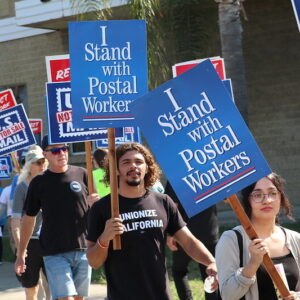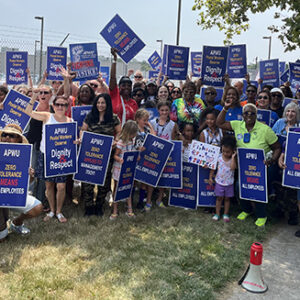March 3, 2026
New FMLA Rules Effective January 16
The APWU has been meeting with the Postal Service regarding the implementation of changes to the Family and Medical Leave Act (FMLA) – changes the Bush Administration implemented just four days before President Bush leaves office. The changes, announced in November, make it harder for workers who are covered by the law to use FMLA leave. The APWU is also updating our FMLA materials (including APWU’s FMLA medical certification forms) to reflect the changes. Those updated materials will be distributed as they become available.
Changes
Included among the changes are: a narrowing of definition of “serious health condition;” requirements for additional medical documentation; requirements that medical documentation be provided more frequently; and permission for employers to contact an employee’s healthcare provider directly, without the employees’ knowledge or permission. The new rules also shorten the amount of time that employees have to provide notice of leave, while giving employers more time to provide notice of eligibility and more time to designate the leave as FMLA.
The new regulations do, however, include one positive change – they now provide special leave rights for military families. The rule allows military families to take leave to care for ill or injured service members and to take leave to help manage the affairs of service members who are away on active duty. Employees who are requesting military family leave should use the new optional Department of Labor (DOL) forms when requesting military family leave until such time that the APWU creates its own forms. (WH-384 is for leave for “qualifying exigencies” to help manage the affairs of service members who are away on active duty, and WH-385 is for leave to care for an ill or injured military service member).
USPS’ “Employee Service Talk”
It has come to the union’s attention that the Postal Service provided managers with a brief “Employee Service Talk” that was to be given to employees. We did not learn of the service talk until after it was distributed. The service talk includes the following:
Employee Notice – The new regulation requires employees who have pending or approved FMLA cases to specifically reference their FMLA condition at time of request for FMLA protected leave.
Please be advised that we informed the Postal Service that the above comment is misleading, and we suggested that it be re-worded. It may lead some managers to believe – incorrectly – that employees must specifically reference their FMLA condition when requesting leave. If an employee has pending or approved FMLA, such employee may simply provide the FMLA case or claim number. If a case or claim number is not available, the employee need only to state the basic “medical facts” concerning the general nature of the employee’s condition, not their medical diagnosis or prognosis. The information is needed to determine whether the leave is for a new or existing serious health condition.
Furthermore, this practice represents existing postal policy, and is not a change as the service talk suggests. The new federal regulations require employees to follow their employer’s regular notification procedures absent unusual circumstances. This means that the employer’s current call-in procedures apply.
In addition, employees do not have to mention FMLA when requesting leave for a covered condition. However, an employee must explain the reasons for the absence and give enough information to allow the employer to determine that the leave qualifies for FMLA protection. If an employee fails to explain the reasons, the leave may not be protected under the FMLA.
APWU’s FMLA Medical Certification Forms
We have received complaints from the field that in some areas local managers have said that as of Jan. 16, 2009, they will no longer accept “APWU’s FMLA Medical Certification Forms,” and some managers have said that employees must now use the new optional DOL WH-380 forms. Please be advised that the APWU was informed by Postal Service Headquarters that they have not instructed their managers to refuse to accept APWU’s forms. The law does not require that medical certification be provided in any specific format.
However, because the new FMLA regulations require certain additional information on an employee’s medical certification form, we are in the process of reviewing and updating the APWU forms, and we will distribute the new forms as soon as they are available. In the meantime, employees may continue to use the current APWU forms so long as the healthcare provider (HCP) includes the following information on the forms:
- The HCP’s address, telephone number, fax number, and type of medical practice/specialty.
- If the employee is requesting intermittent or reduced schedule leave to care for a family member with a serious health condition, a brief statement explaining why such care is medically necessary (this can include assisting in the family member’s recovery).
New Department of Labor Forms
Please note, the two new optional medical certification forms created by the DOL to replace the old optional WH-380 permit the healthcare provider to provide information beyond what is actually required. For example, while the new optional WH-380 forms expressly allow the healthcare provider to state the employee’s medical diagnosis on the form, they are not required to do so.
The APWU’s position has not changed: An employee’s medical diagnosis is private health information that need not, and is not, required to be stated on the form. There were no changes in the law to require the employee’s medical diagnosis to be included on the form. If an employee decides not to use the APWU’ forms and instead chooses to use the DOL optional WH-380 forms, they should tell their healthcare provider to only state the basic “medical facts” concerning the general nature of their condition, not their medical diagnosis or prognosis. If there is a question concerning whether or not management has a right to certain information, the local union may contact their respective National Business Agent or the Industrial Relations Department.



